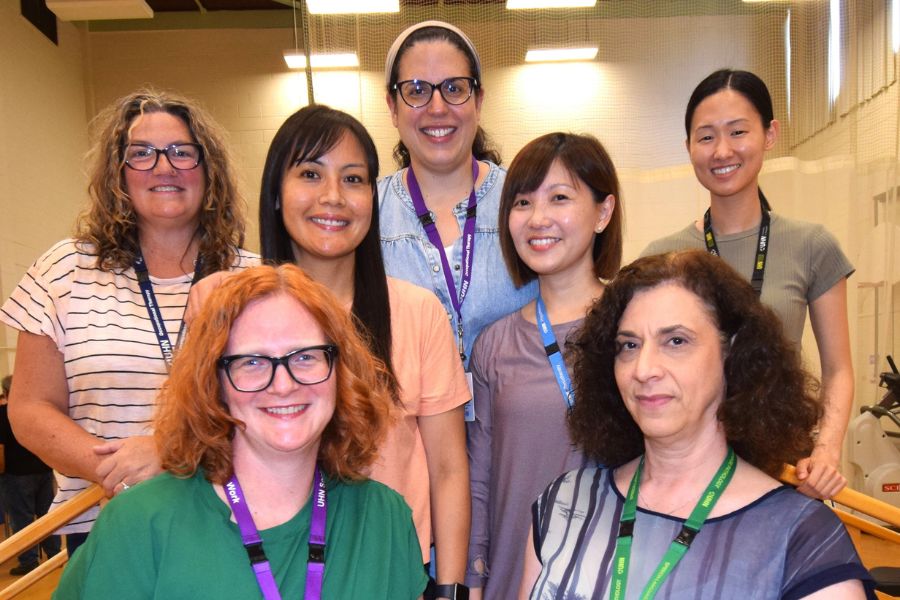Rehab professionals show dedication to patients on the road to recovery every day across UHN. (Photos: UHN)
The impact rehabilitation professionals have on the lives of those living with the effects of disability, illness and aging is felt every day. From spinal cord injury to cardiac rehab, to many specialties in between, clinicians, learners, researchers, and support staff work tirelessly to improve the quality of care for patients at University Health Network (UHN) – and beyond.
Each year these efforts are recognized on Rehabilitation Day, an annual event which falls on the third Tuesday of September. From spinal cord injury to cardiac rehab, and many other specialties in between, this day of awareness acknowledges the important work conducted by those professionals and specialists who have chosen to dedicate their professional lives to field of rehabilitation.
“Our goal is to foster awareness surrounding rehabilitation and the impact that rehab professionals have on our patients and their families,” says Jan Newton, UHN Clinical Vice President, of the fourth edition of Rehabilitation Day, which takes place on Sept. 20.
“Rehabilitation is a life-changing service for many individuals in our community and the work that is done here extends far past UHN.”
In 2019, UHN made an appeal to the City of Toronto regarding an annual day of recognition for the life-changing impact that rehabilitation services have on the community. On behalf of Toronto City Council, Mayor John Tory made a proclamation to recognize the influence of rehabilitative services.
“Rehabilitation Day is an opportunity to celebrate our researchers and clinicians whose collective work positions Toronto as a world leader in rehabilitation care and science,” says Dr. Mark Bayley, Physiatrist-In-Chief and Program Medical Director at Toronto Rehab.
Shiran Isaacksz, Vice President at UHN’s Altum Health, adds: “Rehabilitation professionals get people back to work and life by providing the right care, at the right time, with the right providers. We could not be more proud of Altum Health’s multi-disciplinary rehab teams and all UHN programs that span the continuum of care with the collective goal of delivering an exceptional and integrated patient experience.”
More than medicine
Rehab professionals don’t just provide health care – they are dedicated to helping people overcome their physical limitations and regain strength, resiliency, and independence 365 days a year.
This year, rehab professionals are looking back on the work that they have done to leverage past experiences and plan for future success.
“Rehabilitation allows people to gain back their independence,” says Linda Pugliese, a physical therapist on the Acquired Brain Injury Unit at Toronto Rehab. “We dedicate our careers to giving people a better quality of life.”
Linda’s role is to help patients at the end of their rehab journey safely transition back into their communities. She specifically helps patients and families find community programs that will help them to continue their journey to recovery following discharge.
“The strength and resiliency that I see in my patients is truly inspiring,” says Linda. “Witnessing them deal with life-altering traumas and medical conditions inspires me to be a better clinician.
“I enjoy collaborating with my team members to give patients the best possible outcomes.”
Researching Rehab
Dr. Cesar Marquez-Chin is a scientist at UHN’s KITE Research Institute, where his research focuses on creating new technologies to help people with paralysis regain the ability to move following stroke and spinal cord injury.
“Seeing my patients reach their goals shows me I’m making a difference and motivates me to be better,” he says. “Helping someone eat and dress independently again or do hobbies they love is why I love what I do.”
Dr. Marquez-Chin says he loves his work because he can learn from and improve alongside his peers and provide superior outcomes for patients.
“Toronto Rehab plays a pivotal role in preventing illness and injury thanks to our scientists, trainees and rehab clinicians,” says Dr. Milos R. Popovic, Institute Director at KITE.
“The dedication to their work deserves to be celebrated.”


